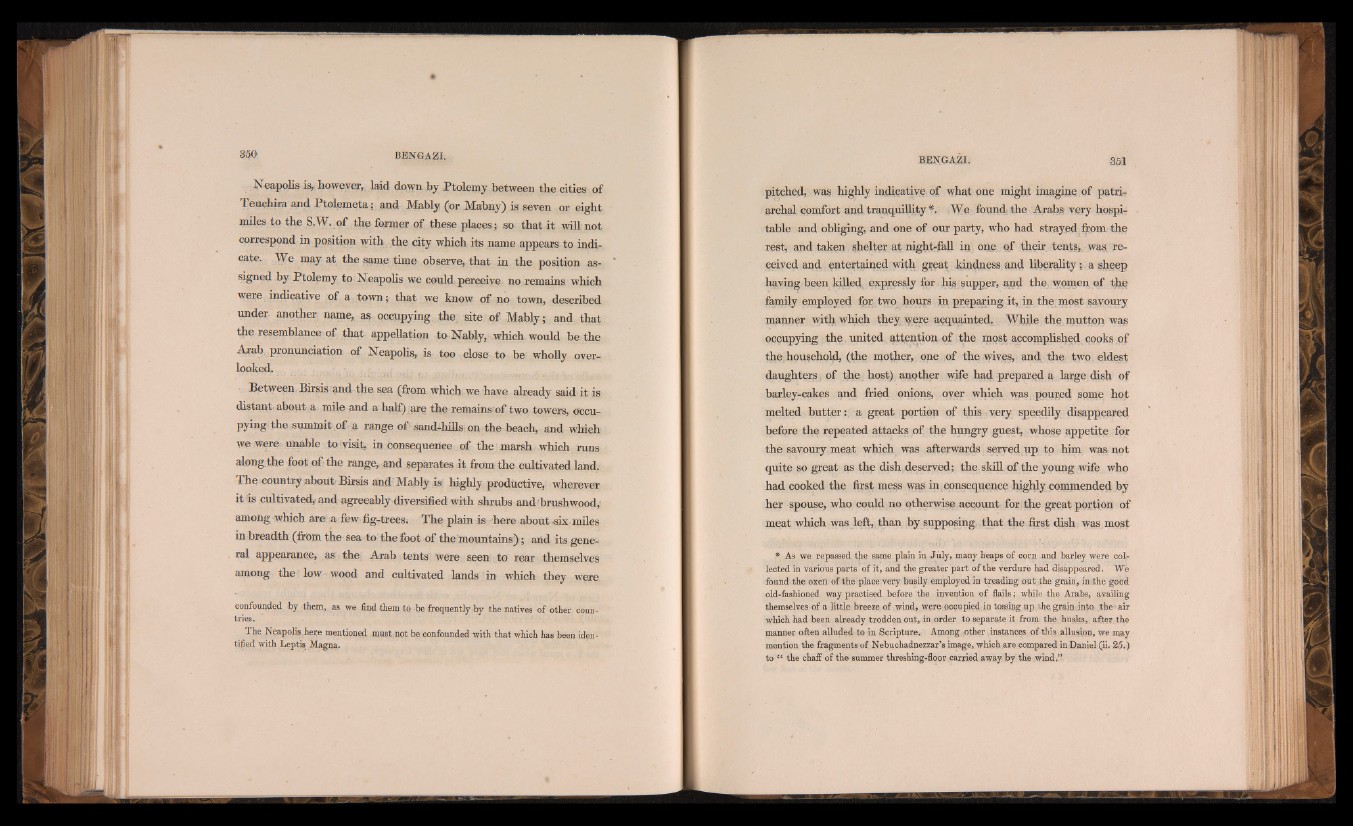
Neapolis is, however,- laid down by Ptolemy between the cities of
Teuchira and Ptolemeta; and Alably (or Mabny) is- seven or eight
miles to the S.W. of the former of these places; so that it will not
correspond in position with the city which its name appears to indicate.
We may at the same time observe, that in the position as-
signed by Ptolemy to Neapolis we could perceive no remains which
were indicative of a town; that we know of no town, described
under another name, as- occupying the, site of Mably; and that
the resemblance of that appellation to Nabiy, which would be the
Arab pronunciation of Neapolis, is too close to be wholly overlooked.
Between, Birsis and the, sea (from which-we have already said it is
distant, about a mile and a half) are the remainsof two towers, occupying
the summit of a range of 'sand-hills, on the beach, and which
we were unable to visit, in consequence of the marsh which runs
along the foot of the range, and separates it from the cultivated land.
-The--country about' Birsis and JVTably is highly productive,' wherever
it is cultivated,, and agreeably diversified with shrubs and1 brush wood,'
amongwhich are ,a few fig-trees. The plain is here about .six-miles
in breadth (from the sea to the foot of the mountains); and its general
appearance, as the Arab tents were seen to rear themselves
among the low wood and cultivated lands in which they were
confounded -by them, as we find them to -be frequently by the natives of other coun-
tries.
The Neapolis,here mentioned must;not be confounded with that which has been identified
with Leptis Magna.
pitched, was highly indicative, of what one might imagine , of patriarchal
comfort and tranquillity *• We found; the Arabs very hospitable
and obliging, and one of our party, who had strayed from the
rest, and taken shelter at night-fall in, one of their tents, was; received
and entertained with gi|eat kindness and liberality; a sheep
having been killed, expjressly for. his supper, and the wqmen of the
family employed ffct.two hours in preparing it, in the most savoury
manner with which they syere acquainted. While the mnttpn was
occupying the united attention of the most accomplished cooks of
the householjd, (the mother, one. .of the wives, and the two eldest
daughters , of the host) another wife had prepared a large dish of
barley-cakes and fried onions, over which was poured some hot
melted butter: a great portion of this very speedily disappeared
before the repeated attacks of the hungry guest, whose appetite for
the savoury meat which was afterwards served up to him was not
quite so great as the dish .deserved; the skill of the young wife who
had cooked the first mess was in,consequence highly commended by
her spouse, who could no otherwise account for the great portion of
meat which was left, than by supposing, that the first dish was most
* As we repassed tjie same plain in July, many heaps of corn and barley were coir
lected in various parts of it, and the greater part of the verdure had disappeared. We
found the oxen of the place very busily employed, in treading out the grain, in/the good
old-fashioned way practised before the invention of flails; while the Arabs, availing
themselves of a little breeze of wind» were occupied in tossing up the, grai^ into the* air
which had been already trodden out* in order to separate it from the, husks, after the
manner often alluded to in Scripture. Among other instances of this allusi,op, we may
mention the fragments of Nebuchadnezzar’s image, which.are compared in Daniel (ii. 25.)
to “ the chaff of the summer threshing-floor carried away by the .wind,”